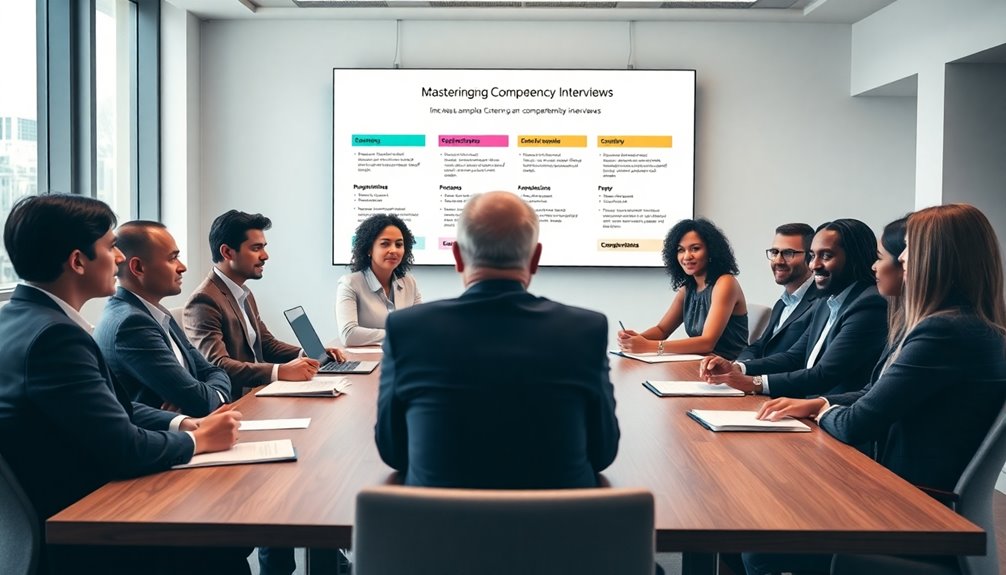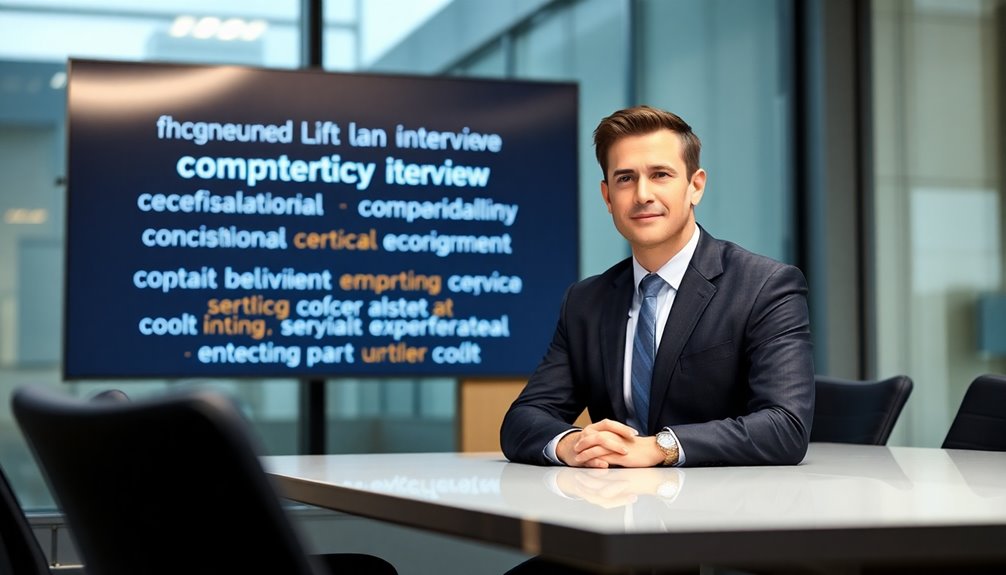Mastering competency interviews means showcasing your qualifications clearly and effectively. You'll face open-ended questions that assess your skills and behaviors relevant to the role. Utilizing the STAR technique helps structure your answers with real-life examples. Focus on key competencies like communication, teamwork, and problem solving. Reflecting on personal achievements boosts your confidence and highlights your leadership abilities. Adaptability is vital too, as it shows you can thrive under pressure and embrace change. With these strategies, you can impress interviewers and stand out from the competition. There's so much more to explore to guarantee you excel in your next interview.
Key Takeaways
- Utilize the STAR technique to structure responses, clearly outlining situations, tasks, actions, and results in your examples.
- Identify and articulate key competencies, such as teamwork and problem-solving, relevant to the job role.
- Reflect on personal achievements to demonstrate leadership and critical thinking during the interview.
- Showcase adaptability by discussing how you successfully navigated unexpected changes in previous roles.
- Highlight strong communication skills through examples of effective dialogue and active listening in team settings.
Understanding Competency Interviews

In today's competitive job market, understanding competency interviews is essential for showcasing your qualifications effectively. These interviews assess your skills, knowledge, and behaviors relevant to the role.
You'll encounter open-ended questions that require you to provide real-life examples from your experiences. To answer these questions effectively, you can use the STAR technique—outlining the Situation, Task, Action, and Result. This structured approach helps convey your impact and thought processes.
Employers focus on your ability to manage work-related scenarios, evaluate your power skills like communication and teamwork, and assess your problem-solving and critical thinking capabilities.
Key Competency Examples

When preparing for competency interviews, it is crucial to identify key competencies that employers commonly seek. Focusing on these competencies can help you stand out. Here are three important examples:
| Competency | Description | Impact |
|---|---|---|
| Working Under Pressure | Ability to manage tasks during tight deadlines | Improved productivity and sales performance |
| Persuading Colleagues | Skills in conflict resolution and negotiation | Successful compromises leading to team success |
| Facing Conflict in a Team | Relationship-building and conflict management | Enhanced collaboration and project outcomes |
Understanding how to navigate effective communication during a breakup can also enhance your interpersonal skills, which are crucial in a team environment.
Personal Achievements Reflection

Often, reflecting on your personal achievements can provide valuable insights into your professional growth and skills development.
Take the time to identify key milestones in your career. Consider how you navigated challenges, managed your time, and leveraged your skills to reach those goals. Each achievement tells a story about your capabilities and dedication.
Think about specific instances where you demonstrated leadership or critical thinking.
These reflections not only prepare you for competency interviews but also bolster your confidence. By understanding the impact of your past experiences, you can articulate your strengths effectively.
Use this reflection to craft compelling narratives that highlight your qualifications, ensuring you're ready to impress potential employers with your growth journey.
Adaptability in the Workplace

Reflecting on personal achievements not only highlights your growth but also sets the stage for understanding how adaptability plays an essential role in the workplace.
When faced with unexpected changes, like shifting project deadlines or team dynamics, your ability to adjust can greatly impact your success. For instance, consider how you might modify your approach to meet new demands or collaborate effectively with diverse team members.
Embrace challenges as opportunities to learn; analyzing obstacles can enhance your critical thinking. By actively seeking clarification on tasks and developing flexible strategies, you not only improve your performance but also demonstrate resilience. Additionally, managing irregular income can further strengthen your adaptability skills, especially in freelance or project-based environments.
This adaptability showcases your readiness for change, making you a valuable asset in any organization.
Professionalism and Integrity

While maneuvering workplace challenges, professionalism and integrity are essential for fostering a positive environment.
You'll want to maintain composure and respect, even in tough situations, as this positively influences team dynamics. Address conflicts constructively and balance your authority with personal values to create a supportive atmosphere.
Integrity plays a critical role in upholding ethical standards; it's important to report any unethical behavior and adhere to established protocols. Doing so not only protects company resources but also cultivates a culture of accountability and trust.
Communication Skills Importance

Effective communication is essential for maneuvering workplace dynamics and achieving team objectives. When you articulate your thoughts clearly, you reduce misunderstandings and foster collaboration.
Listening actively allows you to understand different perspectives, which is vital in resolving conflicts and enhancing teamwork. During competency interviews, demonstrating your communication skills through specific examples showcases your ability to engage, influence, and motivate others.
You might recall instances where your effective dialogue led to successful project outcomes or improved team morale. Remember, strong communication reflects confidence and professionalism, creating an environment where ideas can flourish.
Embracing a Growth Mindset

A growth mindset can transform how you approach challenges and setbacks. Instead of fearing failure, you'll see it as a stepping stone to success.
When faced with difficult competency interview questions, you can draw on past experiences, showcasing how you've learned and grown from each situation. This mindset encourages you to embrace feedback, turning criticism into an opportunity for improvement.
By reflecting on your journey, you can articulate your resilience and adaptability during interviews. Remember, every challenge is a chance to demonstrate your problem-solving skills and commitment to personal development. Incorporating techniques from stress management practices can further enhance your ability to remain calm and focused during high-pressure interviews.
Cultivating a growth mindset not only enhances your interview performance but also sets the stage for continuous professional growth throughout your career.
Frequently Asked Questions
What Types of Roles Typically Use Competency Interviews?
Competency interviews are common in various roles, especially in management, customer service, and technical positions.
If you're applying for jobs that require strong communication, leadership, or problem-solving skills, you can expect these interviews.
Organizations in sectors like healthcare, education, and finance often utilize them to assess how candidates handle real-life situations.
How Can I Prepare for Competency Interview Questions?
To prepare for competency interview questions, start by reviewing the job description and identifying key skills required.
Reflect on your past experiences and use the STAR technique to structure your responses. Practice answering common questions with specific examples that showcase your skills and achievements.
Additionally, consider conducting mock interviews with a friend or mentor to build confidence.
Finally, stay calm and remember to listen carefully to the questions during the interview.
What Common Mistakes Should I Avoid During These Interviews?
Imagine sailing a ship but forgetting to check the weather. In competency interviews, don't make similar mistakes!
Avoid vague answers; use specific examples instead. Don't ramble—stay concise and focused.
Also, steer clear of negative language about past employers or colleagues; it reflects poorly on you.
Finally, don't forget to practice the STAR technique, as it helps you structure your responses effectively, showcasing your skills and experiences clearly!
How Long Do Competency Interviews Usually Last?
Competency interviews usually last between 30 to 60 minutes, depending on the organization and the position.
You'll typically face a series of questions that explore your skills and experiences. To make the most of this time, prepare relevant examples and practice the STAR technique.
How Can I Follow up After a Competency Interview?
After a competency interview, you should follow up with a thank-you email within 24 hours.
Express your appreciation for the opportunity and briefly reiterate your excitement about the role.
Mention a specific aspect of the interview that resonated with you, reinforcing your fit for the position.
Keep it concise and professional.
This shows your enthusiasm and keeps you top of mind as they make their decision.
Conclusion
You might feel overwhelmed by the thought of competency interviews, but remember, you're not alone in this! By using the STAR technique and reflecting on your experiences, you can turn these interviews into a chance to shine. Focus on your strengths, embrace feedback, and stay adaptable. With practice and the right mindset, you'll not only navigate these interviews successfully but also showcase your true potential. So, take a deep breath—you're capable of more than you think!
Eugene brings a fresh, dynamic voice to our platform as one of our talented Writers. Specializing in research-driven content, he explores the latest findings in psychology and personal growth, translating them into actionable insights for our readers. Eugene’s work is fueled by a curiosity about what makes us tick and a desire to help others unlock their potential.










